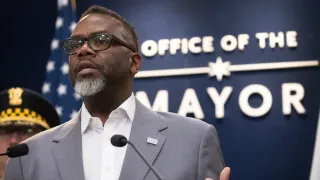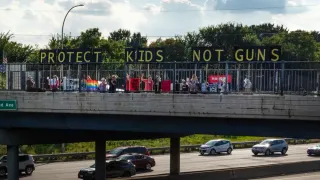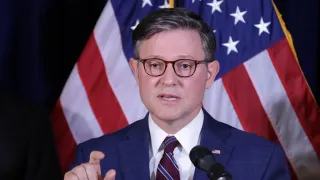
11 hours ago
Broadway’s Javier Muñoz and Drag Icon Peppermint to Lead Activist Lobby in D.C. Against Devastating HIV Funding Cuts
READ TIME: 3 MIN.
Broadway luminary Javier Muñoz and acclaimed drag performer and advocate Peppermint are set to join a coalition of HIV activists, policy leaders, and community voices in Washington, D.C., next week to urge lawmakers to reject a proposal that would cut federal HIV funding by an additional $1 billion. The House bill, now under consideration, threatens to roll back decades of progress in HIV prevention, care, mental health support, and housing services for millions of Americans, including LGBTQ+ communities who continue to be disproportionately affected by HIV/AIDS .
Muñoz, best known for his starring roles in "Hamilton" and his outspoken HIV advocacy, will join Peppermint, a celebrated entertainer and trailblazing transgender advocate, as part of the #SaveHIVFunding campaign. Their presence brings renewed attention to the urgent crisis facing those who rely on federally funded HIV programs. The pair, along with other activists, plan to meet with lawmakers, participate in press briefings, and amplify the message that “HIV funding saves lives” .
For Muñoz, the fight is personal. In a recent interview, he shared, “This is the first organization that I turn to when I tested positive... Every time calls, the answer is yes. It's amazing what they do. If you need any kind of help or guidance through your whole journey with HIV, they're the ones to go to” . Peppermint, who has long used her platform to highlight the barriers faced by transgender people and people of color in accessing HIV care, echoed the urgency of the moment: “These proposed cuts would devastate the communities that already face the greatest challenges in our health care system” .
Since the onset of the HIV/AIDS epidemic, federal funding has been a lifeline for millions. These funds support preventive care like PrEP (pre-exposure prophylaxis), primary care for those living with HIV, mental health services, vital housing programs, and access to lifesaving antiretroviral medications . The #SaveHIVFunding campaign’s press release warns that the proposed $1 billion cut comes on top of “millions in spending reductions during the second Trump administration,” compounding an already precarious situation for service providers and those they serve .
The Black AIDS Institute, a prominent national nonprofit, recently highlighted the ongoing need for robust federal support to address gaps in care, particularly in Black and Brown communities. “Disinvestment in HIV programs will further widen disparities and undermine decades of hard-won progress,” the organization noted in a recent report .
The brunt of these cuts would be felt most by people already facing barriers to care: LGBTQ+ individuals, people with chronic conditions, low-income families, uninsured people, and communities of color. LGBTQ+ advocates stress that HIV funding isn’t just a health issue but a matter of social justice. For transgender people, especially trans women of color, HIV prevalence rates are significantly higher than the general population, and access to affirming, comprehensive care remains a persistent challenge .
Cuts to HIV funding would force clinics to reduce hours or close, limit the distribution of preventative medications like PrEP and PEP, and jeopardize housing and food security for people living with HIV. As Muñoz noted, “Because of what's going on with the politics, we're getting all this funding cut—even education. It's really important to make sure that these kids know about PrEP and take PrEP” .
The proposed cuts have galvanized organizations such as GMHC (Gay Men’s Health Crisis), the Black AIDS Institute, and the #SaveHIVFunding campaign to mobilize supporters nationwide. The campaign is urging individuals to contact their representatives, share their stories, and participate in demonstrations planned during the D.C. lobbying week .
Advocates warn that the United States is at a crossroads: further disinvestment could undo decades of public health achievements and put the nation’s goal of ending the HIV epidemic by 2030 out of reach. “We cannot allow Congress to balance the budget on the backs of people living with HIV,” reads the campaign’s statement .
For many, the presence of high-profile LGBTQ+ figures like Muñoz and Peppermint underscores the power of visibility and collective action. Their advocacy is not only about protecting funding, but also about challenging stigma and ensuring that the voices of people living with HIV remain central to the national conversation.
As Peppermint stated in a recent interview, “We’re not just fighting for funding—we’re fighting for dignity, equality, and the right to thrive. Every person deserves access to the care and support they need, no matter who they are or whom they love” .
The coming days in Washington will test the resolve of Congress—and the strength of a movement determined not to turn back the clock on HIV care and prevention.






